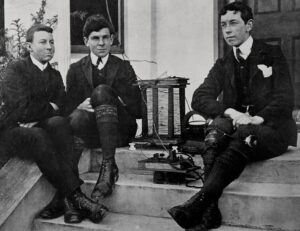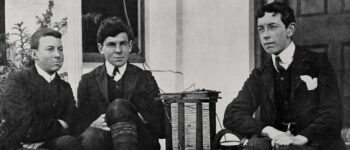1903: Wireless Telegraphy Act
September 23, 2024
By AHNZ
 Today in New Zealand history, 23 September, 1903, the era of Government control over broadcasting began. The Seddon Ministry had passed the Wireless Telegraphy Act of 1903. New Zealand’s Government was the first in the world to exercise a complete state monopoly, denying citizens of their right to transmit or receive radio messages.
Today in New Zealand history, 23 September, 1903, the era of Government control over broadcasting began. The Seddon Ministry had passed the Wireless Telegraphy Act of 1903. New Zealand’s Government was the first in the world to exercise a complete state monopoly, denying citizens of their right to transmit or receive radio messages.
No wonder, then, that it would be children pioneering the forbidden radio technology. On 10 September, 1908, after 2 years of efforts, Dunedin schoolboys Rawson Stark, Stanton Hicks, and Cyril Brandon were pubically recognised for transmitting radio messages. It may be that they were a front for adult New Zealanders who wished to advance us into the world of Information Technology. At any rate, the cover of being educational and involving politicians (Mayors and the Prime Minister himself) and being a youthful distance from the threshold of criminal prosecution were the loopholes that allowed the experiment.
While State history rightly celebrates the teenagers’ achievement it misdirects us from what’s really going on here: By law our country was half a decade behind in the rest of the world. We had maintained a radio silence closely resembling stupidity. Yet the radio revolution was about to transform the human race and become indispensable. Not only would it change commerce and entertainment. These boys, in 6 more years, would be caught up in the Great War. Could New Zealanders afford to be radio Luddites trying to semaphore battle tactics and strategy with flags while an enemy had wireless light-speed communications? As the C20th advanced radio only became more advanced and more important, leading to television and mobile phones and wireless internet.
Knowledge and technology does not advance thanks to government control. The requirement for licences actually killed or drove underground our existing developments. In 1899, again in Dunedin, student teachers Strachan and Scott had been sending radio between rooms. In 1903 another Dunedin teenager, Passmore, was doing it too and would manage transmission of 6 miles. In 1917 the 13yo Morton Coutts made his own 2-way radio (illegal!) Kiwis were hopelessly, hilariously, outgunned. While the rest of the West took steps forward our shoes were tied together by our own government (as per usual.) The first licenced broadcaster, again Dunedin, wasn’t until 17 November 1921: Professor Jack of Otago University.
“The Government intend to acquire a monopoly of this system, just in the same way as has been done in regard to telegraph lines and telephones” – Attorney-General Alfred Pitt speaking to the Legislative Council about radio (c.1903)
“The immediate purpose was to prevent commercial intersts from exploiting wireless telegraphy, or amenities that might grow out of it. Government shore stations for receiving and transmitting in morse were not opened until 1911. In the intervening years, and in spite of a close watch on permits, local research continued.” – NZ Heritage (1971)
“Today in New Zealand history, 23 October, 1966, Radio Hauraki’s ship Tiri set out to bust the State’s monopoly on radio broadcasting. The State has a very long history of controlling the news media in New Zealand. The ‘news’ pathway of all radio news passed through the Prime Minister’s Office for the sake of ‘public interest’. What put a stop to it? Anarchist pirates!” – 1966: Radio Hauraki AHNZ
“One of the main concerns, as outlined by the Postmaster-General of the day, was that the new wireless telegraphy technology might render the wired telegraphy network obsolete and thereby deprive the Government of revenue.” – Wayne Wedderspoon, musickpointradio.org
Remember, to suppress free speech is a double wrong in violating the rights of the listener as well as those of the broadcaster. Yet one of the main reasons The State held Kiwis back was to protect their legacy media: the print media. Most, or many, or all, of our politicians were editors or owners or tightly knit therewith of newspapers. They would be right to fear the loss of this power to control the flow of information. It was the reason they were in their place of privilege at all.
There is a reason that IT is not government regulated. Even the Statists know that any economy that tried to put government in control of this developing technology would put itself behind the rest of the world. Only free people in a free market can excel at great technological projects. Any initial success of any government projects rely on the efforts and minds of such people being conscripted but even then, under government administration, the talent starts to quickly wither.
The politicians of 1903, older men of the Steam Age as they were, had very little idea of what they were banning. Hansard exposes their incompetence. Nor did they take into consideration that to Maoris the radio waves were a “taonga”, and ancestral treasure. It had yet to be scientifically discovered that radio waves existed on a spectrum or that, as per The Treaty of Waitangi (1840) this formed part of Maori’s promised estates and properties. This grievance was later redressed and Maoris today “own” 20% of the commercial spectrum at no charge.
 Like Comment Share
Like Comment Share





